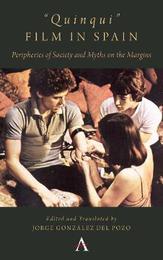
|
"Quinqui" Film in Spain: Peripheries of Society and Myths on the Margins
Hardback
Main Details
| Title |
"Quinqui" Film in Spain: Peripheries of Society and Myths on the Margins
|
| Authors and Contributors |
Edited and translated by Jorge Gonzalez del Pozo
|
| Physical Properties |
| Format:Hardback | | Pages:176 | | Dimensions(mm): Height 229,Width 153 |
|
| Category/Genre | Films and cinema |
|---|
| ISBN/Barcode |
9781785272295
|
| Classifications | Dewey:791.436556 |
|---|
| Audience | | Professional & Vocational | |
|---|
|
Publishing Details |
| Publisher |
Anthem Press
|
| Imprint |
Anthem Press
|
| Publication Date |
31 January 2020 |
| Publication Country |
United Kingdom
|
Description
"Quinqui" Film in Spain focuses on films of the so-called Quinqui genre that became popular during the uncertain transitional period in Spain when the nation moved from a dictatorship to a democracy. The genre refers to films created during the 1970s and 1980s depicting the lives of young criminals from the outskirts of Spanish cities. The Quinqui films, produced and released on shoestring budgets, were nonetheless immensely popular, although never fully considered as part of the national film production in academic circles due to their 'B-Series,' or low quality, nature. These films encapsulated many of the concerns that Spaniards were facing (unemployment, class conflict and disparity, wild economic growth, increasing violence and crime, drugs and so on) and consequently they had an impact on social, cultural and emotional levels in the reborn country. In addition to recent interest in these films as cultural products, "Quinqui" Film in Spain presents a thorough and multi-perspective analysis of the implications for society that these films reveal, clarifying both the Spanish filmic panorama as well as the canon, and the socio-political situation in a country that was going through one of the most controversial and tumultuous times of its contemporary history. '"Quinqui" Film in Spain examines the film production of the Spanish transition to democracy that focussed on the marginalised subjects referred to as 'Quinquis' (delinquents, drug-addicts, young criminals). The book does an outstanding job of editing and selecting very interesting original works related to different aspects of this low-budget genre. [...] This work makes a significant contribution to our understanding of the emergence of democracy in the latter half of twentieth-century Spain.' - Cristina Moreiras-Menor, Professor of Spanish &Women's Studies, University of Michigan, USA
Author Biography
Jorge Gonzalez del Pozo is a full professor of spanish at the University of Michigan-Dearborn where he teaches Spanish literature, film, culture and language.
Reviews"'Quinqui' Film in Spain examines the film production of the Spanish transition to democracy that focussed on the marginalized subjects referred to as "Quinquis" (delinquents, drug-addicts, young criminals). The book does an outstanding job of editing and selecting very interesting original works related to different aspects of this low-budget genre. [...] Together with its predecessor, Fuera de la ley: Asedios al fenomeno quinqui en la transicion Espanola (2015), this work makes a significant contribution to our understanding of the emergence of democracy in the latter half of twentieth-century Spain." -Cristina Moreiras-Menor, Professor of Spanish &Women's Studies, University of Michigan, USA "The book provides an extensive contextualization of the quinqui cultural phenomena, together with a comprehensive explanation of its formal and thematic features, as well as an in-depth analysis of its subversive potential and its long-lasting impact in society. It is an outstanding source of information for film lovers, students, and scholars from many different disciplines who are willing to delve into the history and culture of the Spanish Transicion. - Ortiz-Valencia, Sandra. Review of Quinqui Film in Spain: Peripheries of Society and Myths on the Margins ed. by Jorge Gonzalez del Pozo. Hispania, vol. 104 no. 1, 2021, p. 130-131. Project MUSE, doi:10.1353/hpn.2021.0026. "
|